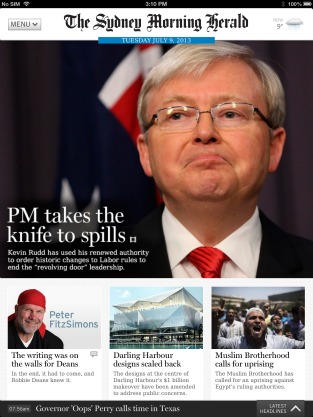Keywords: Democratic Labor Party
-

AUSTRALIA
- Ellena Savage
- 30 August 2013
6 Comments
The moral questions presented in this election demand rational action, and not responses based on aversion to 'illegal' boat arrivals, gay men kissing or the idea of giving hard earned money to government programs in the form of tax. As long as both major parties are vying for ‘politics of disgust’ votes on the backs of vulnerable people, we can’t expect a better nation.
READ MORE 
-

AUSTRALIA
- Nadine Rabah
- 28 August 2013
10 Comments
In ten days I will cast a vote for the first time. I must admit that - unlike many teenagers my age - I do take an interest in political affairs. I know how parliament works and occasionally watch political shows on the ABC. My brother has told me that this is 'really sad'. Voting will be better than receiving a fine in the mail from the Australian Electoral Commission.
READ MORE 
-

AUSTRALIA
- Frank Brennan
- 13 August 2013
1 Comment
'Like many Australians, I had hoped that the dastardly plan announced on 19 July would stop the boats in the short term, as a stop-gap measure. It is dismaying to learn that appropriate consultations had not occurred with Indonesia with the result that the very people who were to receive the shock and awe message are yet to receive it. There’s only one thing worse than shock and awe; that’s shock and awe that doesn’t work because you haven’t done your homework.' 43rd Barry Marshall Memorial Lecture, Trinity College Theological School, 14 August 2013.
READ MORE
-

AUSTRALIA
- Fatima Measham
- 15 July 2013
9 Comments
Voters find it difficult to buy ideas wholesale when they don't make sense in retail. Imagine a voter who would like to see the Labor Party build on reforms in education and health but cannot abide its policy on asylum seekers. This is where the focus on personalities actually matters. Much of the dissatisfaction with leaders ultimately rests on a public assessment of the way policies are prosecuted.
READ MORE 
-

AUSTRALIA
Most voters think that when they fill in a ballot paper they are choosing between the prime minister and the opposition leader. And the fact that they think this makes it so, regardless of the niceties of constitutional theory. The system Rudd is proposing would narrow the gap between voter perceptions and the power of parliamentary blocs to ignore them.
READ MORE 
-

AUSTRALIA
Can Rudd fare any better? He is a formidable campaigner and consistently rates well above either Abbott or Gillard when poll respondents are asked who is their preferred prime minister. What is more, Labor has a success story to tell about the economy, which the Government thus far has failed to sell. Rudd tells this story without illusions.
READ MORE 
-

AUSTRALIA
Gillard's adroit manoeuvring of Abbott into supporting the NDIS will do little to help her come September. People typically vote for whoever they trust to govern, and the public's lack of trust in Labor derives not from policy or the legislative record but from the circumstances in which she became prime minister in the first place.
READ MORE 
-

AUSTRALIA
- John Warhurst
- 02 April 2013
8 Comments
In days past the 'consultancy' activity of former senior politicians was cloaked in respectability and not perceived as being at the hands-on end of lobbying. That pretence has now ended and Alexander Downer and Peter Costello are good examples. It is an unhealthy development with plenty of room for conflicts of interest.
READ MORE 
-

RELIGION
- Frank Brennan
- 25 March 2013
9 Comments
Given the opinion polls and divisions in Labor, it's no surprise Abbott is confidently preparing his team for government. Anything he says about constitutional change therefore carries weight. Advocates for constitutional recognition of Indigenous Australians would be heartened then by two of his recent speeches.
READ MORE 
-

RELIGION
- Frank Brennan
- 21 March 2013
1 Comment
Frank Brennan's address 'Recognising Aboriginal and Torres Strait Islander People in the Constitution' presented at the 18th National Schools Constitutional Convention, The Museum of Australian Democracy at Old Parliament House, 21 March 2013.
READ MORE
-

AUSTRALIA
- Fatima Measham
- 20 March 2013
7 Comments
The Prime Minister's aggressive attempts to tighten the rules for 457 visas is part of a campaign to appease her party's blue-collar base. This didn't begin last month in Western Sydney; it was kick-started as far back as 2011 when she said the 'Australian Greens do not share Australian values'.
READ MORE 
-

AUSTRALIA
- Justin Whelan
- 20 March 2013
9 Comments
Iraq was the first war in history to be declared unjust by the people and by almost all Christian leaders in the West before it had started. One poll found that 90 per cent of Australians opposed the war without UN authorisation. Yet under John Howard's leadership we went to war anyway. Where did the anti-war movement go wrong?
READ MORE 